Entry-Level Software Engineer Resume Examples

Mar 26, 2025
|
12 min read
Craft your entry-level software engineer resume with ease and byte-sized precision. Learn how to code your way through the do’s and don’ts to make your skills stand out while avoiding common pitfalls.
Rated by 348 people
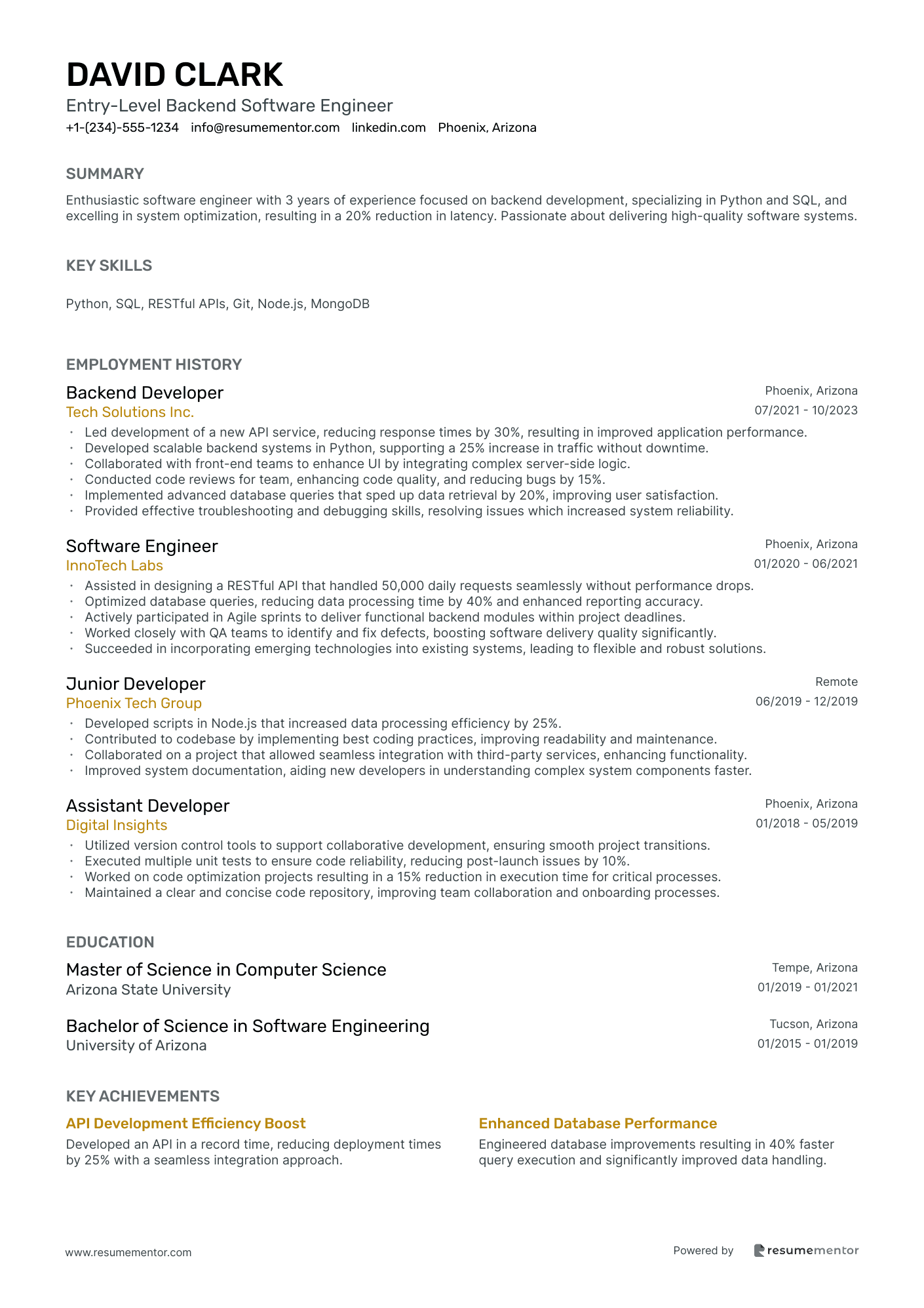
Entry-Level Backend Software Engineer
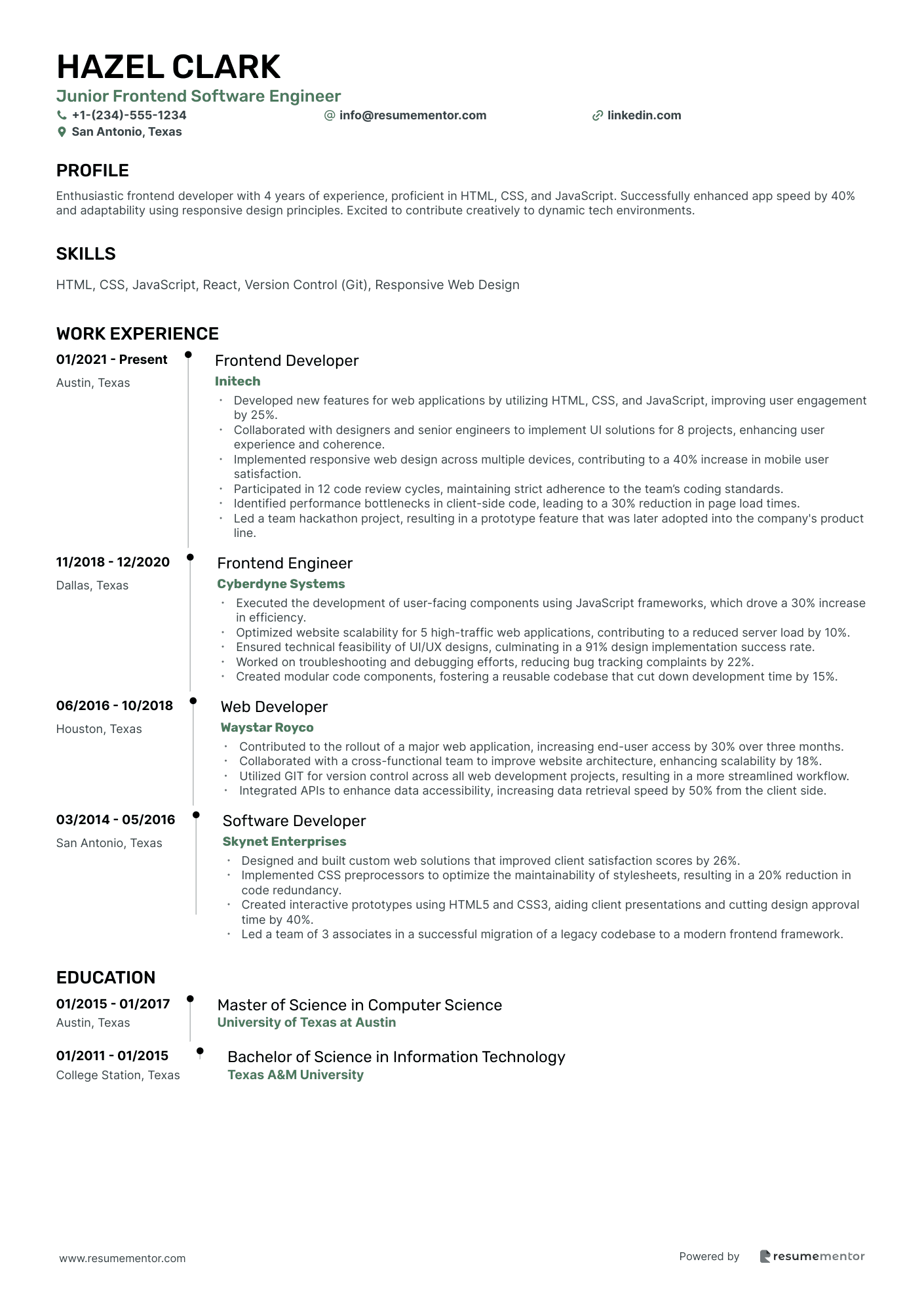
Junior Frontend Software Engineer
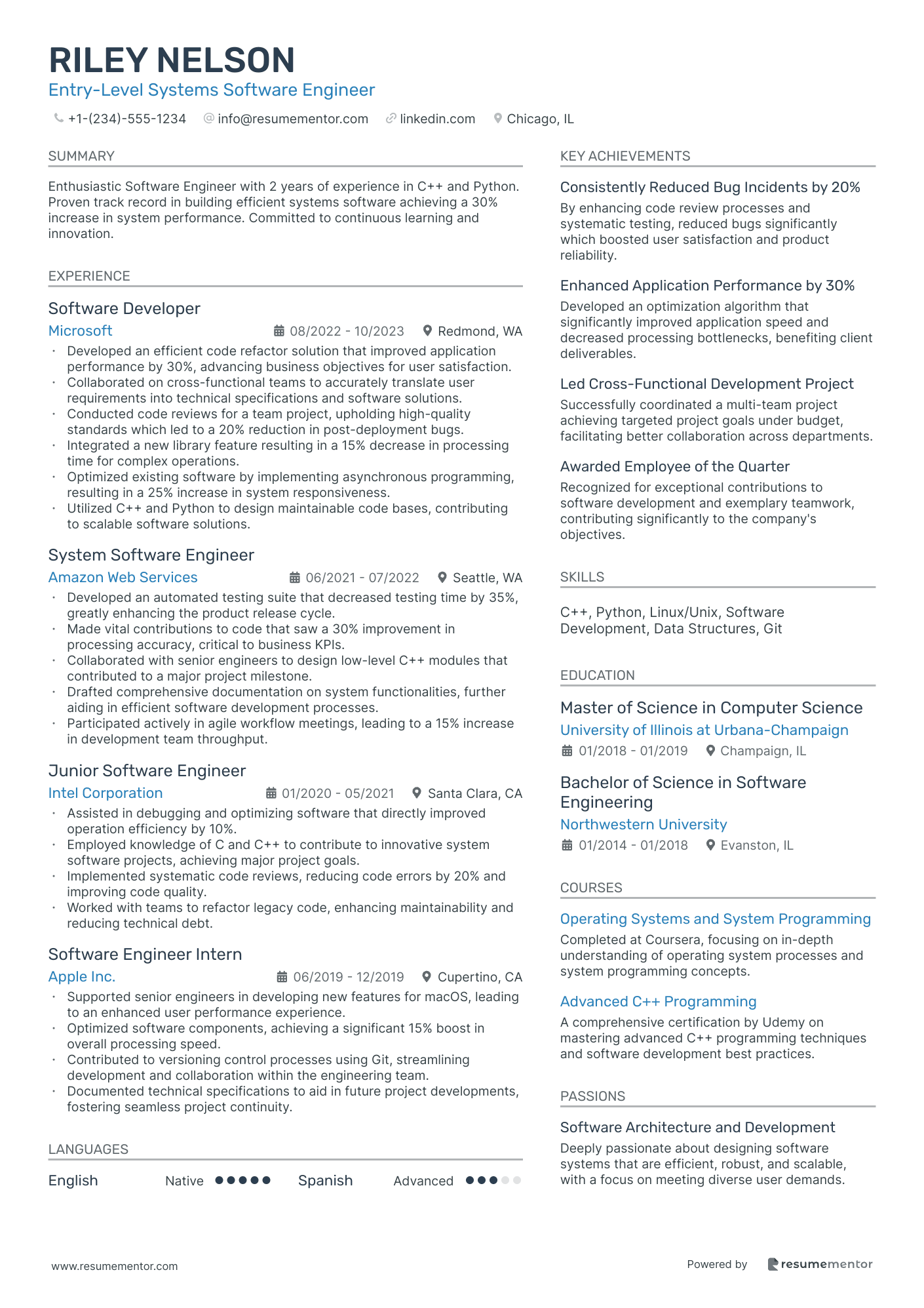
Entry-Level Systems Software Engineer
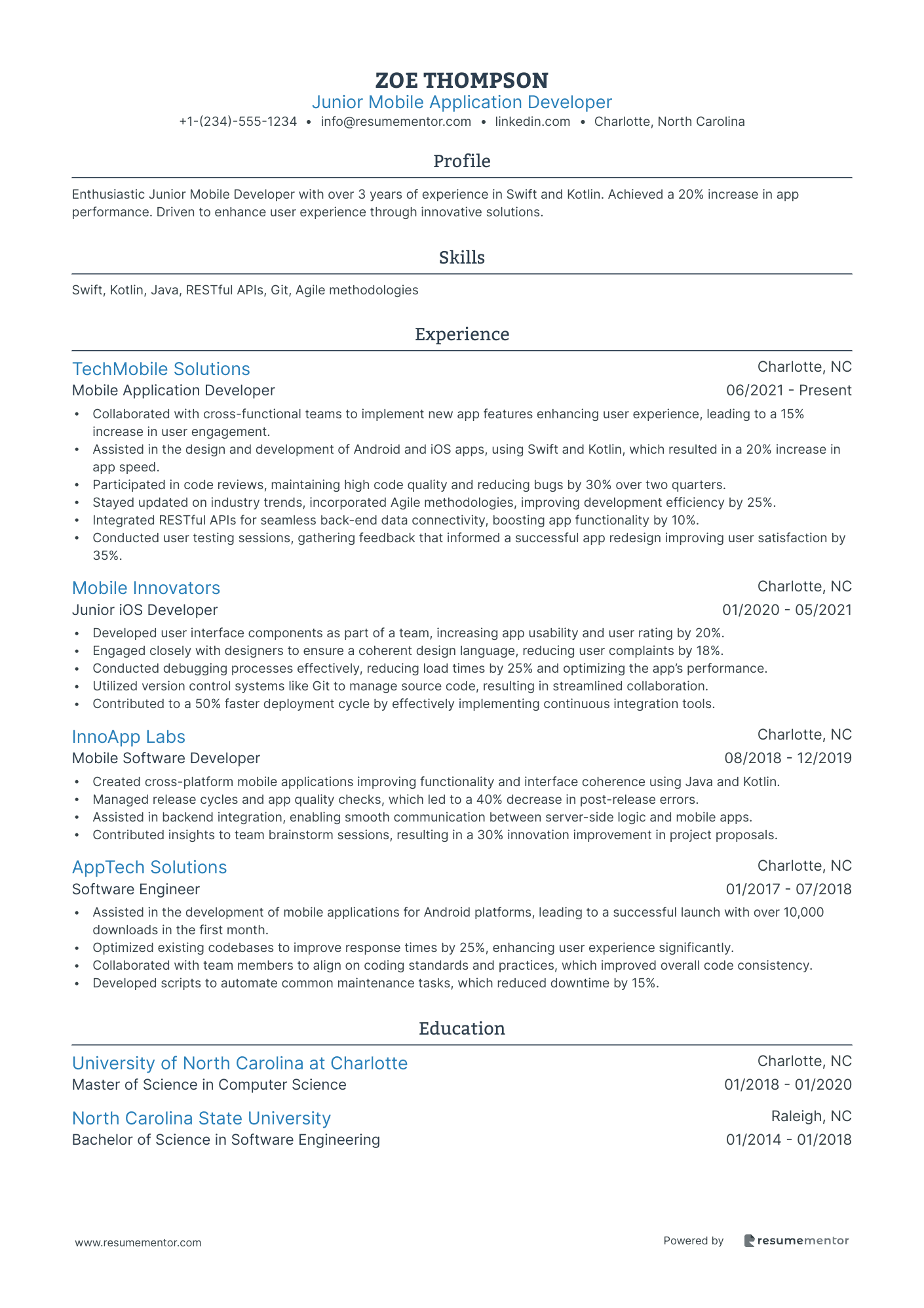
Junior Mobile Application Developer
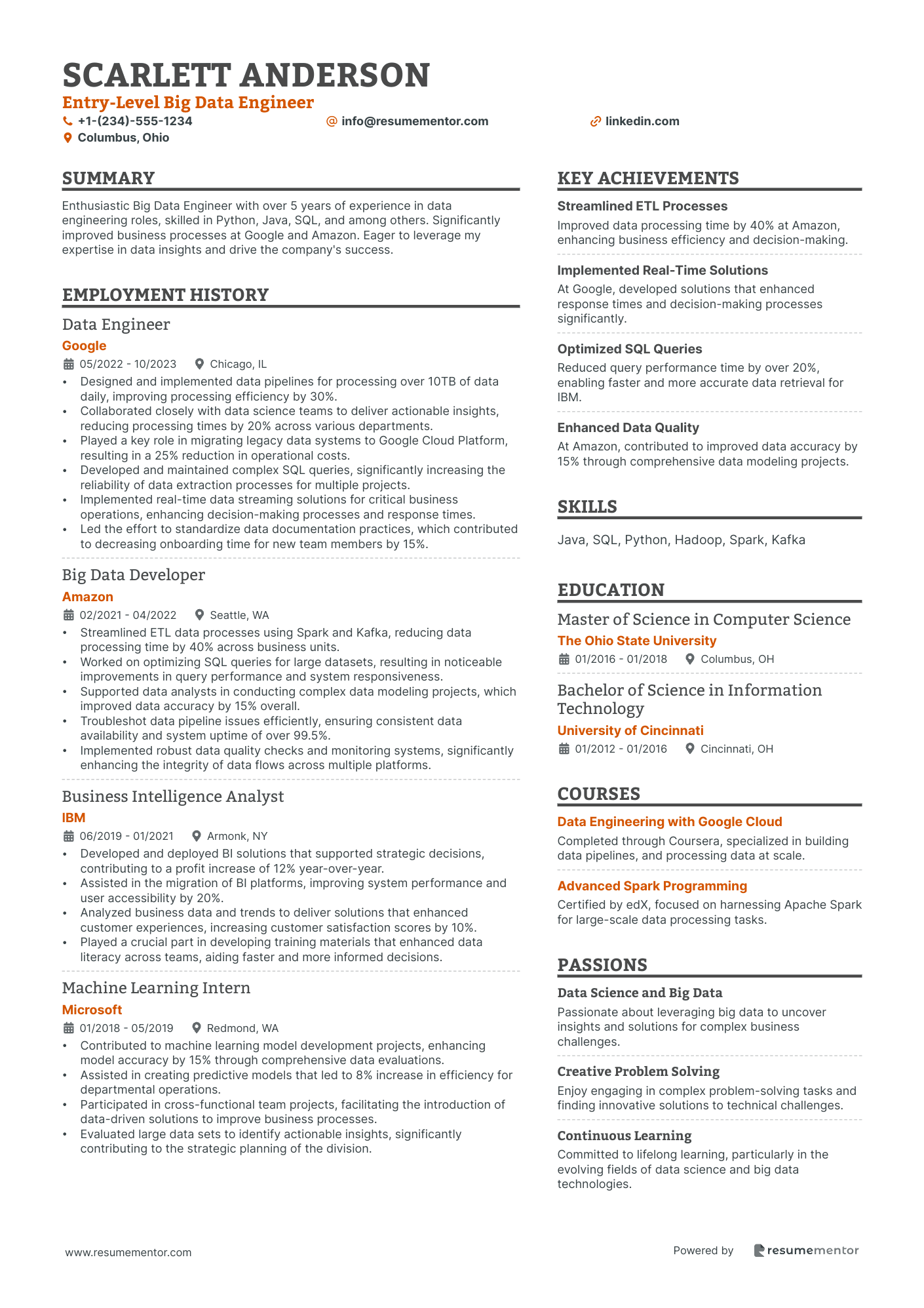
Entry-Level Big Data Engineer
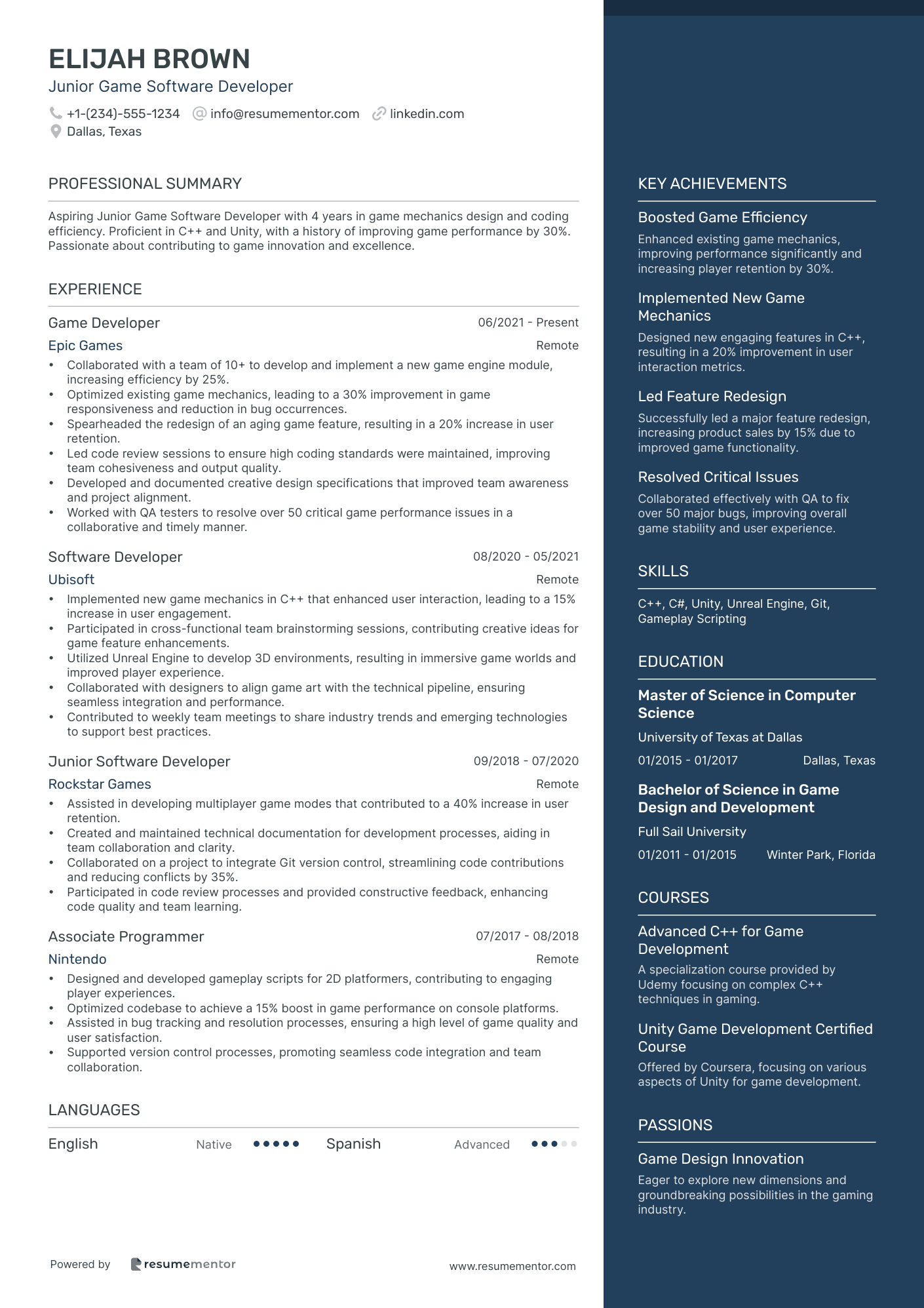
Junior Game Software Developer
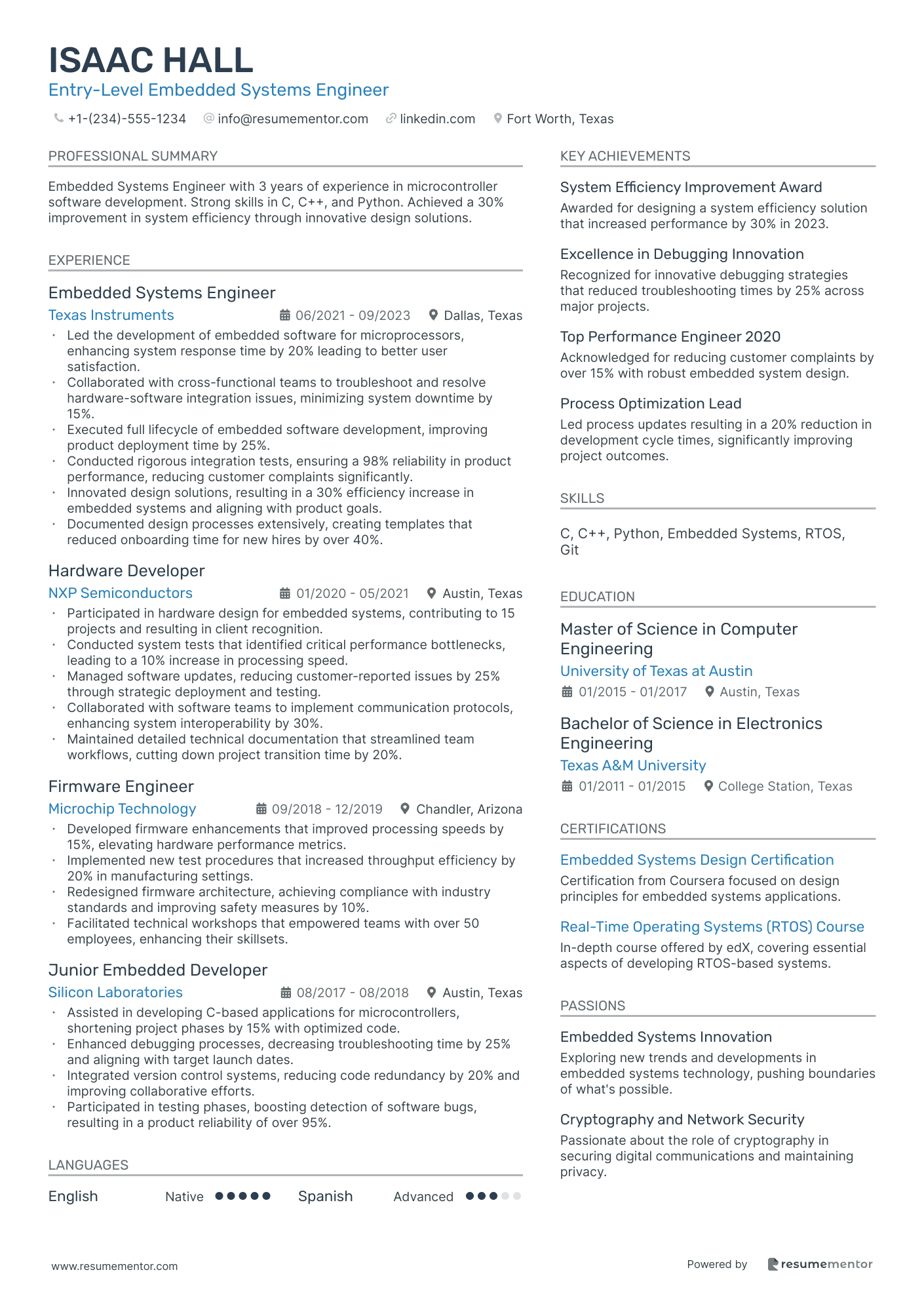
Entry-Level Embedded Systems Engineer
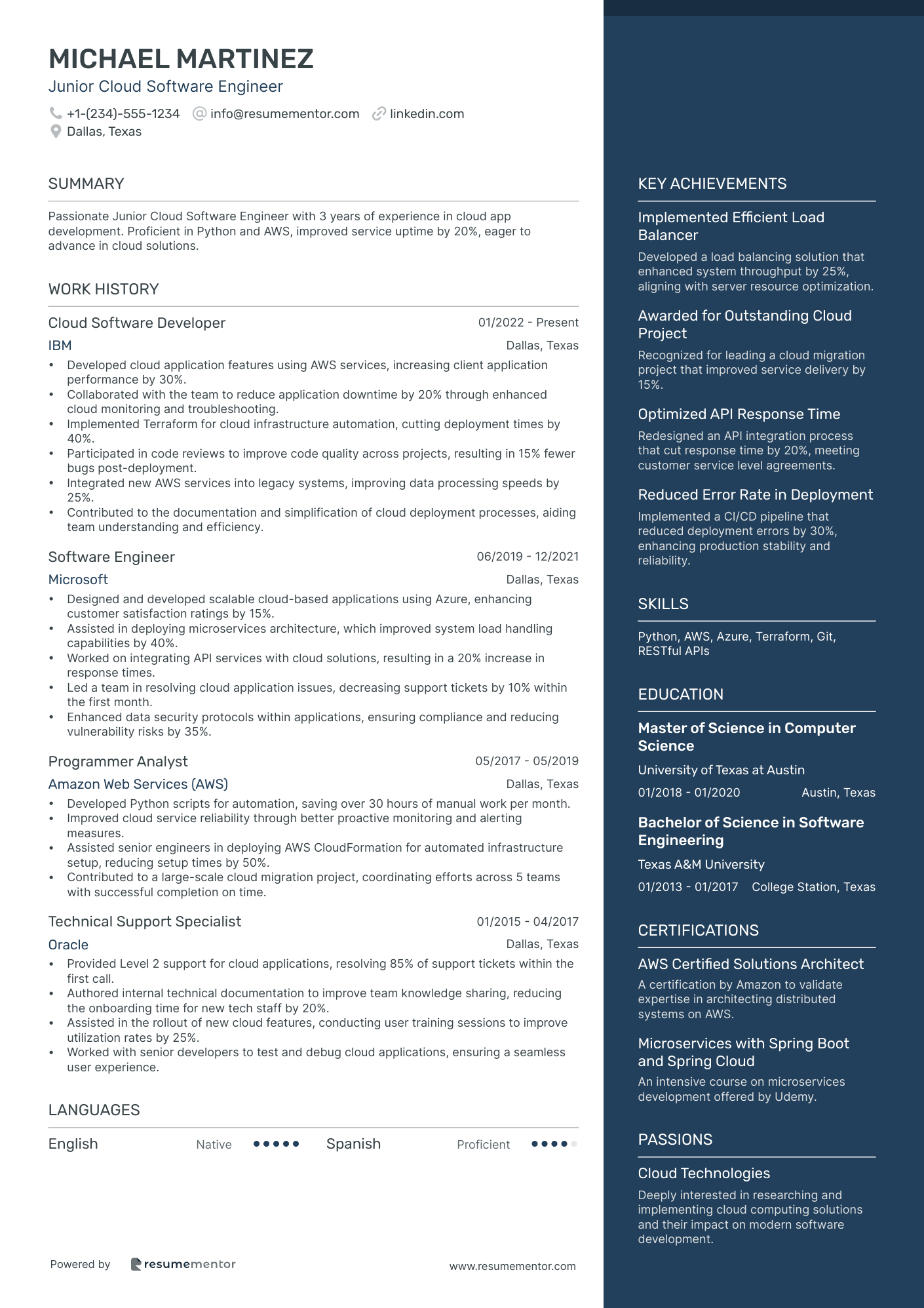
Junior Cloud Software Engineer
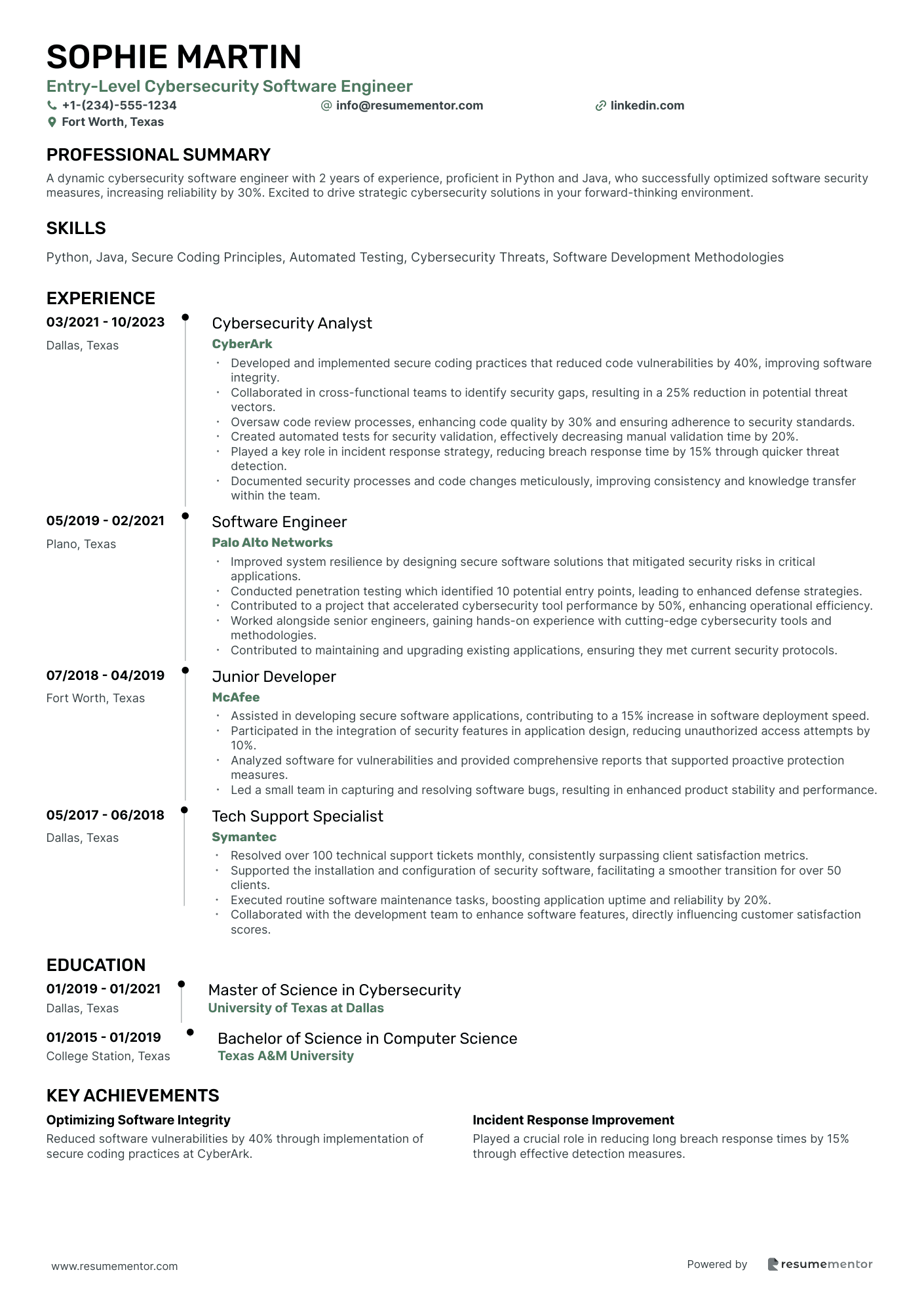
Entry-Level Cybersecurity Software Engineer
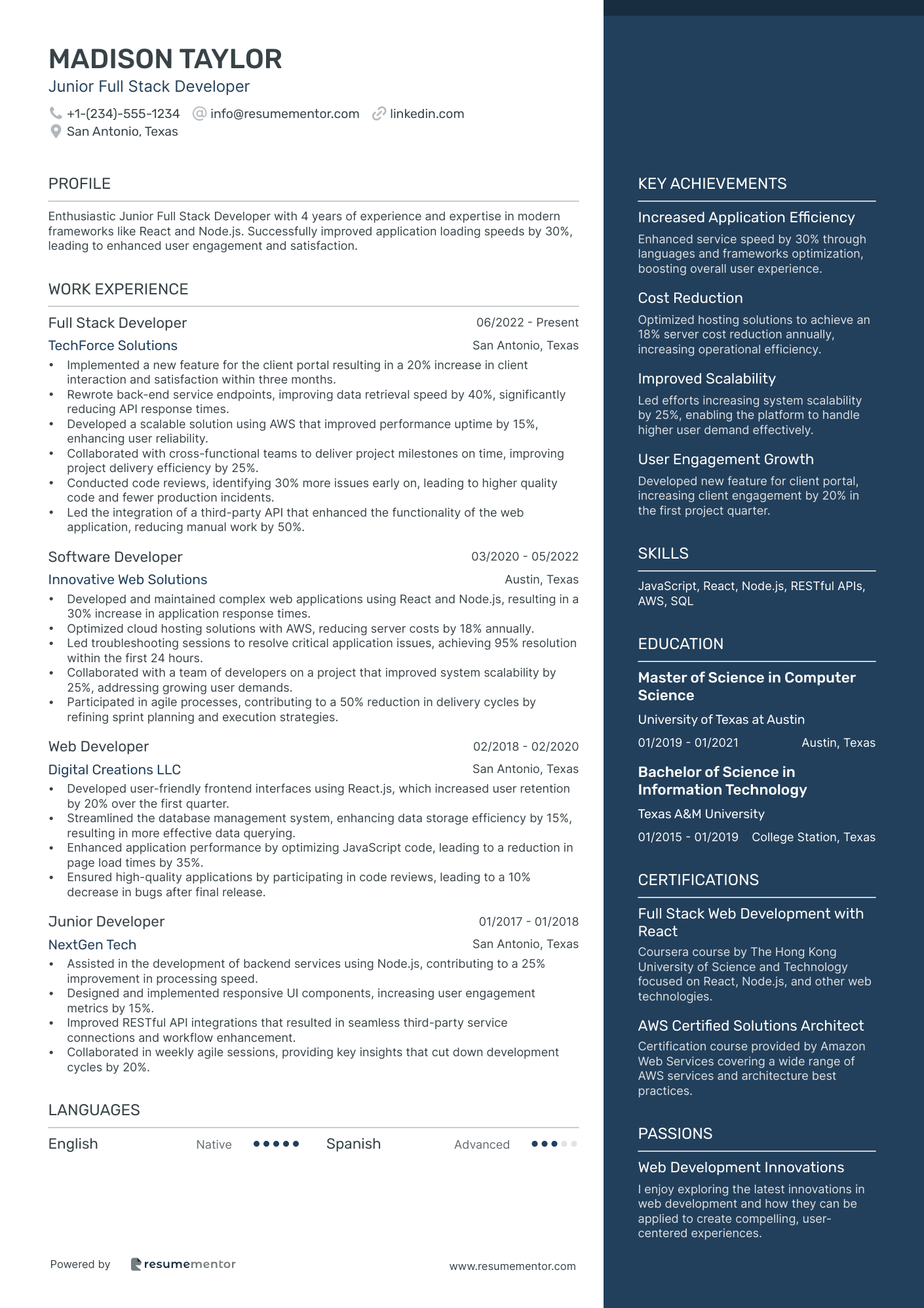
Junior Full Stack Developer

Entry-Level Backend Software Engineer resume sample
- •Led development of a new API service, reducing response times by 30%, resulting in improved application performance.
- •Developed scalable backend systems in Python, supporting a 25% increase in traffic without downtime.
- •Collaborated with front-end teams to enhance UI by integrating complex server-side logic.
- •Conducted code reviews for team, enhancing code quality, and reducing bugs by 15%.
- •Implemented advanced database queries that sped up data retrieval by 20%, improving user satisfaction.
- •Provided effective troubleshooting and debugging skills, resolving issues which increased system reliability.
- •Assisted in designing a RESTful API that handled 50,000 daily requests seamlessly without performance drops.
- •Optimized database queries, reducing data processing time by 40% and enhanced reporting accuracy.
- •Actively participated in Agile sprints to deliver functional backend modules within project deadlines.
- •Worked closely with QA teams to identify and fix defects, boosting software delivery quality significantly.
- •Succeeded in incorporating emerging technologies into existing systems, leading to flexible and robust solutions.
- •Developed scripts in Node.js that increased data processing efficiency by 25%.
- •Contributed to codebase by implementing best coding practices, improving readability and maintenance.
- •Collaborated on a project that allowed seamless integration with third-party services, enhancing functionality.
- •Improved system documentation, aiding new developers in understanding complex system components faster.
- •Utilized version control tools to support collaborative development, ensuring smooth project transitions.
- •Executed multiple unit tests to ensure code reliability, reducing post-launch issues by 10%.
- •Worked on code optimization projects resulting in a 15% reduction in execution time for critical processes.
- •Maintained a clear and concise code repository, improving team collaboration and onboarding processes.
Junior Frontend Software Engineer resume sample
- •Developed new features for web applications by utilizing HTML, CSS, and JavaScript, improving user engagement by 25%.
- •Collaborated with designers and senior engineers to implement UI solutions for 8 projects, enhancing user experience and coherence.
- •Implemented responsive web design across multiple devices, contributing to a 40% increase in mobile user satisfaction.
- •Participated in 12 code review cycles, maintaining strict adherence to the team’s coding standards.
- •Identified performance bottlenecks in client-side code, leading to a 30% reduction in page load times.
- •Led a team hackathon project, resulting in a prototype feature that was later adopted into the company's product line.
- •Executed the development of user-facing components using JavaScript frameworks, which drove a 30% increase in efficiency.
- •Optimized website scalability for 5 high-traffic web applications, contributing to a reduced server load by 10%.
- •Ensured technical feasibility of UI/UX designs, culminating in a 91% design implementation success rate.
- •Worked on troubleshooting and debugging efforts, reducing bug tracking complaints by 22%.
- •Created modular code components, fostering a reusable codebase that cut down development time by 15%.
- •Contributed to the rollout of a major web application, increasing end-user access by 30% over three months.
- •Collaborated with a cross-functional team to improve website architecture, enhancing scalability by 18%.
- •Utilized GIT for version control across all web development projects, resulting in a more streamlined workflow.
- •Integrated APIs to enhance data accessibility, increasing data retrieval speed by 50% from the client side.
- •Designed and built custom web solutions that improved client satisfaction scores by 26%.
- •Implemented CSS preprocessors to optimize the maintainability of stylesheets, resulting in a 20% reduction in code redundancy.
- •Created interactive prototypes using HTML5 and CSS3, aiding client presentations and cutting design approval time by 40%.
- •Led a team of 3 associates in a successful migration of a legacy codebase to a modern frontend framework.
Entry-Level Systems Software Engineer resume sample
- •Developed an efficient code refactor solution that improved application performance by 30%, advancing business objectives for user satisfaction.
- •Collaborated on cross-functional teams to accurately translate user requirements into technical specifications and software solutions.
- •Conducted code reviews for a team project, upholding high-quality standards which led to a 20% reduction in post-deployment bugs.
- •Integrated a new library feature resulting in a 15% decrease in processing time for complex operations.
- •Optimized existing software by implementing asynchronous programming, resulting in a 25% increase in system responsiveness.
- •Utilized C++ and Python to design maintainable code bases, contributing to scalable software solutions.
- •Developed an automated testing suite that decreased testing time by 35%, greatly enhancing the product release cycle.
- •Made vital contributions to code that saw a 30% improvement in processing accuracy, critical to business KPIs.
- •Collaborated with senior engineers to design low-level C++ modules that contributed to a major project milestone.
- •Drafted comprehensive documentation on system functionalities, further aiding in efficient software development processes.
- •Participated actively in agile workflow meetings, leading to a 15% increase in development team throughput.
- •Assisted in debugging and optimizing software that directly improved operation efficiency by 10%.
- •Employed knowledge of C and C++ to contribute to innovative system software projects, achieving major project goals.
- •Implemented systematic code reviews, reducing code errors by 20% and improving code quality.
- •Worked with teams to refactor legacy code, enhancing maintainability and reducing technical debt.
- •Supported senior engineers in developing new features for macOS, leading to an enhanced user performance experience.
- •Optimized software components, achieving a significant 15% boost in overall processing speed.
- •Contributed to versioning control processes using Git, streamlining development and collaboration within the engineering team.
- •Documented technical specifications to aid in future project developments, fostering seamless project continuity.
Junior Mobile Application Developer resume sample
- •Collaborated with cross-functional teams to implement new app features enhancing user experience, leading to a 15% increase in user engagement.
- •Assisted in the design and development of Android and iOS apps, using Swift and Kotlin, which resulted in a 20% increase in app speed.
- •Participated in code reviews, maintaining high code quality and reducing bugs by 30% over two quarters.
- •Stayed updated on industry trends, incorporated Agile methodologies, improving development efficiency by 25%.
- •Integrated RESTful APIs for seamless back-end data connectivity, boosting app functionality by 10%.
- •Conducted user testing sessions, gathering feedback that informed a successful app redesign improving user satisfaction by 35%.
- •Developed user interface components as part of a team, increasing app usability and user rating by 20%.
- •Engaged closely with designers to ensure a coherent design language, reducing user complaints by 18%.
- •Conducted debugging processes effectively, reducing load times by 25% and optimizing the app’s performance.
- •Utilized version control systems like Git to manage source code, resulting in streamlined collaboration.
- •Contributed to a 50% faster deployment cycle by effectively implementing continuous integration tools.
- •Created cross-platform mobile applications improving functionality and interface coherence using Java and Kotlin.
- •Managed release cycles and app quality checks, which led to a 40% decrease in post-release errors.
- •Assisted in backend integration, enabling smooth communication between server-side logic and mobile apps.
- •Contributed insights to team brainstorm sessions, resulting in a 30% innovation improvement in project proposals.
- •Assisted in the development of mobile applications for Android platforms, leading to a successful launch with over 10,000 downloads in the first month.
- •Optimized existing codebases to improve response times by 25%, enhancing user experience significantly.
- •Collaborated with team members to align on coding standards and practices, which improved overall code consistency.
- •Developed scripts to automate common maintenance tasks, which reduced downtime by 15%.
Entry-Level Big Data Engineer resume sample
- •Designed and implemented data pipelines for processing over 10TB of data daily, improving processing efficiency by 30%.
- •Collaborated closely with data science teams to deliver actionable insights, reducing processing times by 20% across various departments.
- •Played a key role in migrating legacy data systems to Google Cloud Platform, resulting in a 25% reduction in operational costs.
- •Developed and maintained complex SQL queries, significantly increasing the reliability of data extraction processes for multiple projects.
- •Implemented real-time data streaming solutions for critical business operations, enhancing decision-making processes and response times.
- •Led the effort to standardize data documentation practices, which contributed to decreasing onboarding time for new team members by 15%.
- •Streamlined ETL data processes using Spark and Kafka, reducing data processing time by 40% across business units.
- •Worked on optimizing SQL queries for large datasets, resulting in noticeable improvements in query performance and system responsiveness.
- •Supported data analysts in conducting complex data modeling projects, which improved data accuracy by 15% overall.
- •Troubleshot data pipeline issues efficiently, ensuring consistent data availability and system uptime of over 99.5%.
- •Implemented robust data quality checks and monitoring systems, significantly enhancing the integrity of data flows across multiple platforms.
- •Developed and deployed BI solutions that supported strategic decisions, contributing to a profit increase of 12% year-over-year.
- •Assisted in the migration of BI platforms, improving system performance and user accessibility by 20%.
- •Analyzed business data and trends to deliver solutions that enhanced customer experiences, increasing customer satisfaction scores by 10%.
- •Played a crucial part in developing training materials that enhanced data literacy across teams, aiding faster and more informed decisions.
- •Contributed to machine learning model development projects, enhancing model accuracy by 15% through comprehensive data evaluations.
- •Assisted in creating predictive models that led to 8% increase in efficiency for departmental operations.
- •Participated in cross-functional team projects, facilitating the introduction of data-driven solutions to improve business processes.
- •Evaluated large data sets to identify actionable insights, significantly contributing to the strategic planning of the division.
Junior Game Software Developer resume sample
- •Collaborated with a team of 10+ to develop and implement a new game engine module, increasing efficiency by 25%.
- •Optimized existing game mechanics, leading to a 30% improvement in game responsiveness and reduction in bug occurrences.
- •Spearheaded the redesign of an aging game feature, resulting in a 20% increase in user retention.
- •Led code review sessions to ensure high coding standards were maintained, improving team cohesiveness and output quality.
- •Developed and documented creative design specifications that improved team awareness and project alignment.
- •Worked with QA testers to resolve over 50 critical game performance issues in a collaborative and timely manner.
- •Implemented new game mechanics in C++ that enhanced user interaction, leading to a 15% increase in user engagement.
- •Participated in cross-functional team brainstorming sessions, contributing creative ideas for game feature enhancements.
- •Utilized Unreal Engine to develop 3D environments, resulting in immersive game worlds and improved player experience.
- •Collaborated with designers to align game art with the technical pipeline, ensuring seamless integration and performance.
- •Contributed to weekly team meetings to share industry trends and emerging technologies to support best practices.
- •Assisted in developing multiplayer game modes that contributed to a 40% increase in user retention.
- •Created and maintained technical documentation for development processes, aiding in team collaboration and clarity.
- •Collaborated on a project to integrate Git version control, streamlining code contributions and reducing conflicts by 35%.
- •Participated in code review processes and provided constructive feedback, enhancing code quality and team learning.
- •Designed and developed gameplay scripts for 2D platformers, contributing to engaging player experiences.
- •Optimized codebase to achieve a 15% boost in game performance on console platforms.
- •Assisted in bug tracking and resolution processes, ensuring a high level of game quality and user satisfaction.
- •Supported version control processes, promoting seamless code integration and team collaboration.
Entry-Level Embedded Systems Engineer resume sample
- •Led the development of embedded software for microprocessors, enhancing system response time by 20% leading to better user satisfaction.
- •Collaborated with cross-functional teams to troubleshoot and resolve hardware-software integration issues, minimizing system downtime by 15%.
- •Executed full lifecycle of embedded software development, improving product deployment time by 25%.
- •Conducted rigorous integration tests, ensuring a 98% reliability in product performance, reducing customer complaints significantly.
- •Innovated design solutions, resulting in a 30% efficiency increase in embedded systems and aligning with product goals.
- •Documented design processes extensively, creating templates that reduced onboarding time for new hires by over 40%.
- •Participated in hardware design for embedded systems, contributing to 15 projects and resulting in client recognition.
- •Conducted system tests that identified critical performance bottlenecks, leading to a 10% increase in processing speed.
- •Managed software updates, reducing customer-reported issues by 25% through strategic deployment and testing.
- •Collaborated with software teams to implement communication protocols, enhancing system interoperability by 30%.
- •Maintained detailed technical documentation that streamlined team workflows, cutting down project transition time by 20%.
- •Developed firmware enhancements that improved processing speeds by 15%, elevating hardware performance metrics.
- •Implemented new test procedures that increased throughput efficiency by 20% in manufacturing settings.
- •Redesigned firmware architecture, achieving compliance with industry standards and improving safety measures by 10%.
- •Facilitated technical workshops that empowered teams with over 50 employees, enhancing their skillsets.
- •Assisted in developing C-based applications for microcontrollers, shortening project phases by 15% with optimized code.
- •Enhanced debugging processes, decreasing troubleshooting time by 25% and aligning with target launch dates.
- •Integrated version control systems, reducing code redundancy by 20% and improving collaborative efforts.
- •Participated in testing phases, boosting detection of software bugs, resulting in a product reliability of over 95%.
Junior Cloud Software Engineer resume sample
- •Developed cloud application features using AWS services, increasing client application performance by 30%.
- •Collaborated with the team to reduce application downtime by 20% through enhanced cloud monitoring and troubleshooting.
- •Implemented Terraform for cloud infrastructure automation, cutting deployment times by 40%.
- •Participated in code reviews to improve code quality across projects, resulting in 15% fewer bugs post-deployment.
- •Integrated new AWS services into legacy systems, improving data processing speeds by 25%.
- •Contributed to the documentation and simplification of cloud deployment processes, aiding team understanding and efficiency.
- •Designed and developed scalable cloud-based applications using Azure, enhancing customer satisfaction ratings by 15%.
- •Assisted in deploying microservices architecture, which improved system load handling capabilities by 40%.
- •Worked on integrating API services with cloud solutions, resulting in a 20% increase in response times.
- •Led a team in resolving cloud application issues, decreasing support tickets by 10% within the first month.
- •Enhanced data security protocols within applications, ensuring compliance and reducing vulnerability risks by 35%.
- •Developed Python scripts for automation, saving over 30 hours of manual work per month.
- •Improved cloud service reliability through better proactive monitoring and alerting measures.
- •Assisted senior engineers in deploying AWS CloudFormation for automated infrastructure setup, reducing setup times by 50%.
- •Contributed to a large-scale cloud migration project, coordinating efforts across 5 teams with successful completion on time.
- •Provided Level 2 support for cloud applications, resolving 85% of support tickets within the first call.
- •Authored internal technical documentation to improve team knowledge sharing, reducing the onboarding time for new tech staff by 20%.
- •Assisted in the rollout of new cloud features, conducting user training sessions to improve utilization rates by 25%.
- •Worked with senior developers to test and debug cloud applications, ensuring a seamless user experience.
Entry-Level Cybersecurity Software Engineer resume sample
- •Developed and implemented secure coding practices that reduced code vulnerabilities by 40%, improving software integrity.
- •Collaborated in cross-functional teams to identify security gaps, resulting in a 25% reduction in potential threat vectors.
- •Oversaw code review processes, enhancing code quality by 30% and ensuring adherence to security standards.
- •Created automated tests for security validation, effectively decreasing manual validation time by 20%.
- •Played a key role in incident response strategy, reducing breach response time by 15% through quicker threat detection.
- •Documented security processes and code changes meticulously, improving consistency and knowledge transfer within the team.
- •Improved system resilience by designing secure software solutions that mitigated security risks in critical applications.
- •Conducted penetration testing which identified 10 potential entry points, leading to enhanced defense strategies.
- •Contributed to a project that accelerated cybersecurity tool performance by 50%, enhancing operational efficiency.
- •Worked alongside senior engineers, gaining hands-on experience with cutting-edge cybersecurity tools and methodologies.
- •Contributed to maintaining and upgrading existing applications, ensuring they met current security protocols.
- •Assisted in developing secure software applications, contributing to a 15% increase in software deployment speed.
- •Participated in the integration of security features in application design, reducing unauthorized access attempts by 10%.
- •Analyzed software for vulnerabilities and provided comprehensive reports that supported proactive protection measures.
- •Led a small team in capturing and resolving software bugs, resulting in enhanced product stability and performance.
- •Resolved over 100 technical support tickets monthly, consistently surpassing client satisfaction metrics.
- •Supported the installation and configuration of security software, facilitating a smoother transition for over 50 clients.
- •Executed routine software maintenance tasks, boosting application uptime and reliability by 20%.
- •Collaborated with the development team to enhance software features, directly influencing customer satisfaction scores.
Junior Full Stack Developer resume sample
- •Implemented a new feature for the client portal resulting in a 20% increase in client interaction and satisfaction within three months.
- •Rewrote back-end service endpoints, improving data retrieval speed by 40%, significantly reducing API response times.
- •Developed a scalable solution using AWS that improved performance uptime by 15%, enhancing user reliability.
- •Collaborated with cross-functional teams to deliver project milestones on time, improving project delivery efficiency by 25%.
- •Conducted code reviews, identifying 30% more issues early on, leading to higher quality code and fewer production incidents.
- •Led the integration of a third-party API that enhanced the functionality of the web application, reducing manual work by 50%.
- •Developed and maintained complex web applications using React and Node.js, resulting in a 30% increase in application response times.
- •Optimized cloud hosting solutions with AWS, reducing server costs by 18% annually.
- •Led troubleshooting sessions to resolve critical application issues, achieving 95% resolution within the first 24 hours.
- •Collaborated with a team of developers on a project that improved system scalability by 25%, addressing growing user demands.
- •Participated in agile processes, contributing to a 50% reduction in delivery cycles by refining sprint planning and execution strategies.
- •Developed user-friendly frontend interfaces using React.js, which increased user retention by 20% over the first quarter.
- •Streamlined the database management system, enhancing data storage efficiency by 15%, resulting in more effective data querying.
- •Enhanced application performance by optimizing JavaScript code, leading to a reduction in page load times by 35%.
- •Ensured high-quality applications by participating in code reviews, leading to a 10% decrease in bugs after final release.
- •Assisted in the development of backend services using Node.js, contributing to a 25% improvement in processing speed.
- •Designed and implemented responsive UI components, increasing user engagement metrics by 15%.
- •Improved RESTful API integrations that resulted in seamless third-party service connections and workflow enhancement.
- •Collaborated in weekly agile sessions, providing key insights that cut down development cycles by 20%.
Launching your career as an entry-level software engineer is like diving into a vast, dynamic landscape. You’ve got the coding skills ready to shine, but transforming that expertise into a standout resume is often the first big hurdle. This document isn't just a list of skills; it's your gateway to future opportunities, designed to grab the attention of prospective employers.
Deciding what aspects of your experience to highlight can feel like piecing together a complex puzzle. With limited work history, every word on your resume must have impact. If you're unsure where to begin or how to format it all, using a resume template can offer much-needed structure. Templates help ensure your resume is clear and highlights the essential technical skills relevant to the job market.
Bridging your coding ability into a narrative that speaks to hiring managers is crucial. This transition from coding environments to a paper format might seem intimidating but is essential for making an impression. Whether your strengths lie in Python, Java, or C++, each section of your resume should strategically align with your career aspirations.
Gaining entry into your desired job means effectively communicating your enthusiasm and potential. With the right tools, your resume can become a true reflection of your abilities and ambitions. Begin confidently with a resume template to showcase your skills and experiences in a polished, professional manner.
Key Takeaways
- Transforming coding skills into a standout resume is essential for seizing future job opportunities, making the resume more than just a list of skills but a gateway to potential employers.
- Using a resume template can help structure your resume, ensuring clarity and emphasizing essential technical skills relevant to the job market.
- Your resume should strategically align each section with your career aspirations, whether your strengths lie in programming languages like Python, Java, or C++.
- Entry into your desired job is achieved through effectively communicating enthusiasm and potential, with the resume reflecting your abilities and ambitions in a polished, professional manner.
- Reverse-chronological format is the industry standard for showcasing recent experiences, using a modern font aids professionalism, and saving as a PDF ensures your formatting stays intact for review.
What to focus on when writing your entry-level software engineer resume
An entry-level software engineer resume should clearly communicate your passion for technology and the essential skills you bring to the table. It lets recruiters know that you have the coding expertise needed for entry-level roles, and you're eager to learn and grow in the field.
How to structure your entry-level software engineer resume
- Contact Information: Start with your full name, phone number, and a professional email address, ensuring recruiters can easily reach you. Adding a LinkedIn profile can also enrich your contact section—this starts your resume on a strong and professional note.
- Objective Statement: Craft a brief statement that aligns your career goals with your enthusiasm for software engineering. Highlight your proficiency in specific programming languages or technologies to make an immediate impact—this sets the tone for why you are the right fit for the job.
- Education: Your educational background is key, so list your degree(s), relevant coursework, and any honors or distinctions. This helps set the foundation for your technical knowledge, showing that your academic experiences align with the industry's demands—it's where your learning journey becomes evident.
- Technical Skills: Clearly outline the programming languages you know, such as Java, Python, or C++, along with any development tools or operating systems you're familiar with. This shows your readiness to tackle technical challenges, reinforcing your qualifications with a detailed skillset—demonstrating both depth and breadth.
- Projects: Bring your resume to life by describing software-related projects you've completed. Detail the project's objectives, the technologies you used, and your specific contributions to demonstrate real-world application of your skills—illustrating how theory turned into action in your hands.
- Internship/Experience: If you have any, include internships or part-time work that relate to software engineering. Focus on what you learned and achieved, providing a glimpse into your hands-on experience and growth—this bridges your academic knowledge with practical experience.
Consider adding sections like "Certifications" or "Volunteer Experience," offering additional dimensions to your profile. A well-organized resume format is crucial as it ensures each section is highlighted effectively; below, we'll cover each section more in-depth.
Which resume format to choose
Creating a standout resume as an entry-level software engineer involves a few critical elements that work in harmony. Begin with a reverse-chronological format, which is the industry standard for highlighting your most recent experiences and puts your latest accomplishments front and center. This format is particularly useful in tech, where updates in skills and projects are frequent. Next, choose a modern font like Lato, Raleway, or Montserrat. These fonts offer a contemporary look that mirrors the tech field's forward-thinking nature and keeps your resume professional yet fresh. As you finalize your resume, save it as a PDF. This file format ensures that your careful formatting remains intact, making it easier for hiring managers to review on any device they choose. Lastly, keep your margins at about one inch on all sides. This not only gives your resume a clean and organized appearance but also makes reading through your accomplishments and skills a seamless experience. By paying attention to these details, you'll craft a resume that effectively captures what you bring to the table and stands out in a crowded job market.
How to write a quantifiable resume experience section
Showcasing your achievements in your entry-level software engineer resume experience section is crucial for making a strong impression. Begin by listing your most recent experience and work backward, but don't go beyond the last 5-7 years unless older experience is exceptional. Use clear job titles and company names directly related to the positions you’re targeting to create a strong link. Tailor each description based on the job ad, emphasizing the skills and experiences they are seeking. Action verbs such as "developed" and "improved" vividly highlight your contributions. Quantifying your achievements ensures that potential employers immediately see your impact.
- •Implemented a new login feature that improved user retention by 15%.
- •Developed automated scripts reducing testing time by 30%.
- •Collaborated with a team of 5 to expedite project timeline by 20%.
- •Contributed to increasing application performance by optimizing code, enhancing speed by 25%.
This experience section is highly effective because it connects specific, measurable accomplishments with the job requirements. Each bullet point demonstrates different strengths, from enhancing teamwork to boosting efficiency, showing a well-rounded skill set. Tailoring it specifically for the desired role with action-oriented verbs and concrete results makes it attention-grabbing. By focusing on the outcomes of your efforts rather than just listing tasks, you make it easy for employers to recognize your value. The clean structure keeps your most impactful contributions in the spotlight, making it easy to read and understand.
Responsibility-Focused resume experience section
A responsibility-focused entry-level software engineer resume experience section should effectively highlight both your contributions and the resulting impact. Start by choosing a focused heading, such as "Software Development Projects," to clearly indicate the emphasis of your experience. Describe how you applied your skills to achieve tangible results, like enhancing features, increasing efficiency, or supporting team efforts. These descriptions not only showcase your technical abilities but also highlight your teamwork and problem-solving skills.
Using bullet points, detail your roles and the value you brought to each project. For instance, if you developed a feature that improved user interaction, mention the tools you employed and the positive effects it had. You can further emphasize your collaborative spirit by describing how you worked with teammates or provided support to others. Such details help paint a vivid picture of your role and its effectiveness. Throughout, aim to demonstrate the growth of your skills and their alignment with a software engineering role.
Junior Developer
Local Non-Profit Organization
June 2022 - August 2022
- Developed a web application using HTML, CSS, and JavaScript, improving site load speed by 30%.
- Collaborated with a team of 4 to design and implement a user-friendly interface, increasing user engagement.
- Utilized GitHub for version control, ensuring organized and efficient code management.
- Debugged and resolved software issues, enhancing system reliability and user satisfaction.
Skills-Focused resume experience section
A skills-focused entry-level software engineer resume experience section should effectively highlight your abilities and tie them to your experiences. Begin by using internships, projects, or volunteer work to illustrate your skills in action. Start each entry with a clear job title that matches the role you're seeking, followed by the name of the company or project. Describe your contributions over 2-3 sentences, emphasizing the tangible impact you made. Including specific examples and quantifying your achievements, like reducing errors by 10% or increasing efficiency by 15%, adds strong evidence of your capabilities.
In your bullet points, concentrate on particular skills such as coding languages, problem-solving, or teamwork. Each bullet should begin with a strong action verb and focus on what you achieved. For example, replace generic phrases like “Used Python” with detailed statements such as “Developed a web application using Python, enhancing load speed by 20%.” Structure your examples as a coherent story that flows from one point to the next, ensuring it resonates with potential employers.
Software Engineering Intern
Tech Innovations Inc.
June 2022 - August 2022
- Designed a mobile application using Java, improving customer engagement by 30%.
- Collaborated with a team to implement a new feature in an existing platform, which increased user retention by 15%.
- Led debugging sessions, reducing bug occurrence by 20% through efficient testing practices.
- Conducted code reviews, improving overall code quality and ensuring adherence to company standards.
Leadership-Focused resume experience section
A leadership-focused entry-level software engineer resume experience section should clearly demonstrate your ability to take initiative and positively impact your team and projects. Emphasize experiences where you showcased leadership skills, whether by leading projects, mentoring peers, or proposing innovative solutions. Even if you haven't held a formal management position, highlight your ability to work collaboratively and drive change. Use active, specific language to describe your achievements, as this can show your readiness to grow within a company.
When listing your experiences, start with the most recent roles, including dates, job titles, and the organization name. Use bullet points to clearly present your leadership contributions, focusing on projects you led or improved, processes you enhanced, or successes you supported. Quantifying your achievements with metrics, such as time saved or efficiency improvements, can be particularly compelling to prospective employers. This structured approach not only highlights your leadership potential but also makes a strong case for your ability to take on greater responsibilities.
Software Engineering Intern
Tech Solutions Inc.
June 2022 - Present
- Led a team of five in developing a web application for a local nonprofit, improving their donation process by 30%.
- Initiated a coding mentorship program, pairing experienced coders with beginners, resulting in increased project efficiency.
- Coordinated weekly team meetings, setting agendas and leading problem-solving sessions to tackle roadblocks.
- Successfully integrated new version control practices, reducing code conflicts and improving collaboration.
Industry-Specific Focus resume experience section
A software-focused entry-level engineer resume experience section should clearly highlight your technical abilities, project contributions, and any experiences involving teamwork or leadership. Start by listing the dates of your experience to set a clear timeline, then specify your job title, such as "Intern Software Developer," along with the company's name. As you craft bullet points, emphasize specific technical skills or tools such as programming languages or software frameworks that you applied in your work. This connects naturally to describing the features you developed or problems you solved, showing how you contributed to these projects.
Connecting these efforts to your collaborative work, mention any teamwork initiatives that underscore your ability to thrive in group settings. Make your achievements stand out by quantifying results, which help employers see your impact more clearly. Whether you made efficiency gains or enhanced user experience, these improvements demonstrate your value. If you took part in team endeavors, point out your role and any leadership responsibilities, as these aspects indicate your potential for growth. By seamlessly highlighting these elements, you can effectively present your experience and skills, making your resume compelling to potential employers.
Intern Software Developer
Tech Innovators Inc.
June 2022 - August 2022
- Developed and implemented a new feature in a web application, improving loading time by 20%.
- Worked with a team of 5 developers to design and test a user-friendly interface for a mobile app.
- Used Python and JavaScript to automate repetitive tasks, boosting team productivity by 15%.
- Took part in code reviews and helped enhance code quality and project documentation.
Write your entry-level software engineer resume summary section
A software-focused entry-level engineer resume summary should paint a vivid picture of your potential and passion. Start with a compelling statement that highlights your relevant skills and experiences in software development, showcasing how they prepare you to contribute effectively in a professional role. Here's an example formatted as JSON:
This summary smoothly connects your educational background, practical experience, and enthusiasm for software engineering. It effectively mentions specific programming skills and expresses your eagerness to learn and innovate, making it clear why you’re a strong candidate.
When describing yourself, focus on using active language that highlights your unique qualities. Instead of just listing skills, illustrate how you've applied them in real situations. Often, people mix up a resume summary and a resume objective. Remember, a summary emphasizes what you offer to an employer, while an objective is more about your career aspirations. A resume profile is similar but might include more on your personal attributes, while a summary of qualifications usually lists key skills and achievements. Though both styles have their merits, a summary can create a more engaging and personal narrative. Keep in mind, this section is your opportunity to pitch why you’re the right fit, so tailor it to each job you apply for.
Listing your entry-level software engineer skills on your resume
A skills-focused entry-level software engineer resume should effectively highlight your technical and interpersonal abilities. Opt for a standalone skills section or integrate your skills into areas like your experience and summary to convey a well-rounded profile. Having a dedicated skills section lets recruiters quickly identify your capabilities, while integrating them into your experience demonstrates how you've applied these skills in real scenarios.
Including strengths and soft skills sets you apart by showing you're not only technically skilled but also capable of collaborating and adapting. Hard skills, such as coding languages and tools, are specific, teachable abilities critical for your job. These skills and strengths serve as resume keywords that can help your resume get noticed in applicant tracking systems and by hiring managers searching for candidates with particular competencies.
Here's an example of a standalone skills section that effectively communicates your abilities:
This skills section is concise and relevant, ensuring you make a strong impression. By listing key skills like programming languages and development tools, you highlight your technical foundation and your ability to thrive in a tech-driven environment.
Best hard skills to feature on your entry-level software engineer resume
The hard skills you include should showcase your technical abilities and readiness for job tasks. Proficiency with programming languages, frameworks, and tools is crucial in software development, making these skills essential for your resume.
Hard Skills
- Java
- Python
- C++
- JavaScript
- SQL
- HTML/CSS
- Git
- Bash/Shell scripting
- Agile Methodology
- API Designing
- Object-Oriented Programming (OOP)
- Version Control
- Data Structures
- Operating Systems (Linux/Windows)
- Debugging
Best soft skills to feature on your entry-level software engineer resume
Soft skills demonstrate your ability to communicate, collaborate, and adapt within a team. Highlighting these abilities shows your capacity to work well with others and address challenges constructively, making you a valuable addition to any team.
Soft Skills
- Communication
- Teamwork
- Problem-solving
- Critical thinking
- Time management
- Adaptability
- Creativity
- Emotional intelligence
- Conflict resolution
- Attention to detail
- Decision making
- Patience
- Open-mindedness
- Accountability
- Self-motivation
How to include your education on your resume
The education section is a critical part of your entry-level software engineer resume. It shows the foundation of your knowledge and skills. Make sure this section aligns with the job you're applying for. Avoid including any irrelevant education that doesn't support your application. Include details like your GPA if it's impressive (usually above 3.0), as it can strengthen your application. If you graduated with honors, such as cum laude, include that as well to highlight your achievements. List your degree clearly and mention the institution where you earned it.
Here’s an example of an incorrect education section:
Here’s an example of a good education section:
The second example is strong because it’s relevant to a software engineering position. The degree aligns with the field, signaling to employers that you have the necessary background. Listing cum laude shows excellence and dedication. Including a GPA of 3.8 further emphasizes your capabilities and academic success. This combination makes your resume stand out to potential employers, showing readiness for the job.
How to include entry-level software engineer certificates on your resume
Including a certificates section in your entry-level software engineer resume is crucial. Certifications can showcase your skills and dedication. List the name of each certification clearly to ensure the reader understands your qualifications. Include the date you received each certificate to show your timeline of achievement. Add the issuing organization to establish legitimacy and trust.
Optional, but effective, certifications can also be part of the resume header. For example, you might write: "John Doe | Entry-Level Software Engineer | AWS Certified Developer." Use this approach to instantly highlight your expertise.
Here is an example of a standalone certificates section that works well:
This example is effective because it lists relevant certificates for a software engineer. Each certification is easily readable and the issuer is noted, adding legitimacy. The selection demonstrates technical skills and knowledge of agile practices, making you a well-rounded candidate. The relevance of each certificate matters because it reflects your dedication to key industry standards.
Extra sections to include on your entry-level software engineer resume
Crafting a compelling resume is crucial for landing an entry-level software engineering role. While technical skills are important, adding sections that showcase your personal and professional development can set you apart.
- Language section — Highlight any languages you know to show your global readiness and capacity to work in diverse teams.
- Hobbies and interests section — Illustrate how your hobbies align with your creativity and problem-solving skills, key traits in any software engineering job.
- Volunteer work section — Showcase your volunteer experiences to emphasize your teamwork, leadership, and commitment to the community.
- Books section — Mention technology or personal growth books you've read recently to show your dedication to continuous learning and development.
These sections not only make your resume more comprehensive but also act as conversation starters during interviews. They illustrate essential skills beyond coding that employers often look for.
In Conclusion
In conclusion, starting your career as an entry-level software engineer requires more than just technical skills—crafting a compelling resume is essential. Your resume serves as your personal marketing tool, highlighting your coding abilities, education, and relevant experiences. By strategically showcasing your skills and achievements, you open doors to potential opportunities in the dynamic field of software engineering.
Using resume templates can simplify the process, ensuring your document is structured well and effectively presents your qualifications. Each section of your resume should be meticulously crafted, from contact information to certifications. Your technical skills, such as proficiency in programming languages like Python, Java, and C++, give you a competitive edge. Additionally, incorporating both hard and soft skills demonstrates a well-rounded personality, capable of thriving in team environments and tackling complex challenges.
Education provides the necessary foundation, so highlight relevant coursework and any honors to underscore your academic background. Including projects and internships further showcases your practical application of skills, bridging the gap between theoretical knowledge and real-world experiences. Certifications can also bolster your resume by validating your skills and dedication to professional growth.
Crafting a skills-focused resume experience section with quantifiable achievements paints a clear picture of your impact. Tailoring your resume to match job requirements and using modern formatting techniques ensure it stands out. By integrating your passion for technology and personal interests, you convey a complete profile to potential employers, showcasing readiness to contribute effectively to their teams.
Ultimately, your resume is a dynamic document that evolves alongside your career. Regularly updating it with new projects, skills, and experiences ensures you remain an attractive candidate in this ever-evolving industry. Each section, detail, and format choice contributes to making your resume a powerful tool in your job search.
Related Articles

Continue Reading
Check more recommended readings to get the job of your dreams.
Resume
Resources
Tools
© 2026. All rights reserved.
Made with love by people who care.

